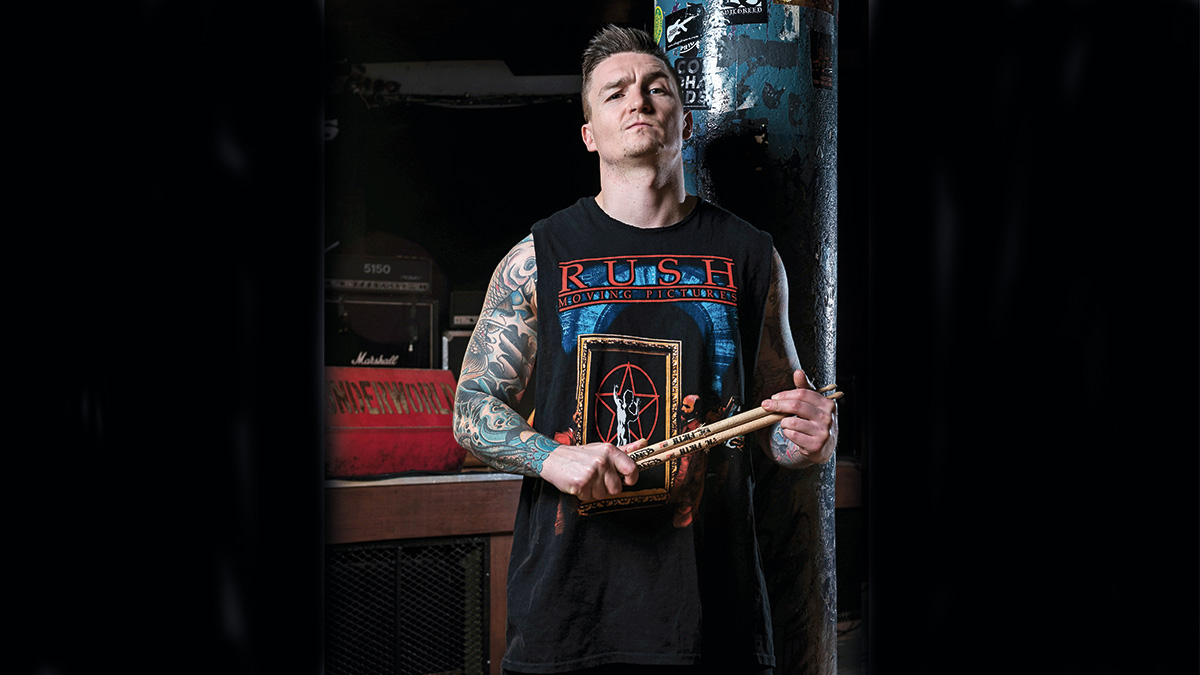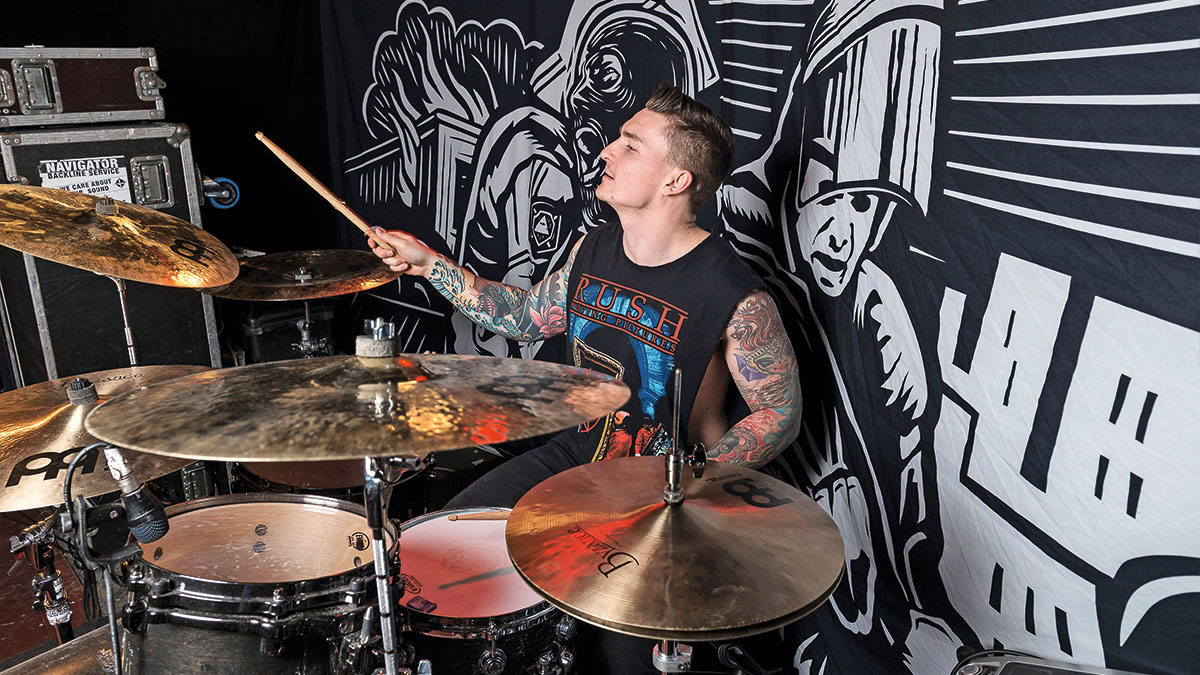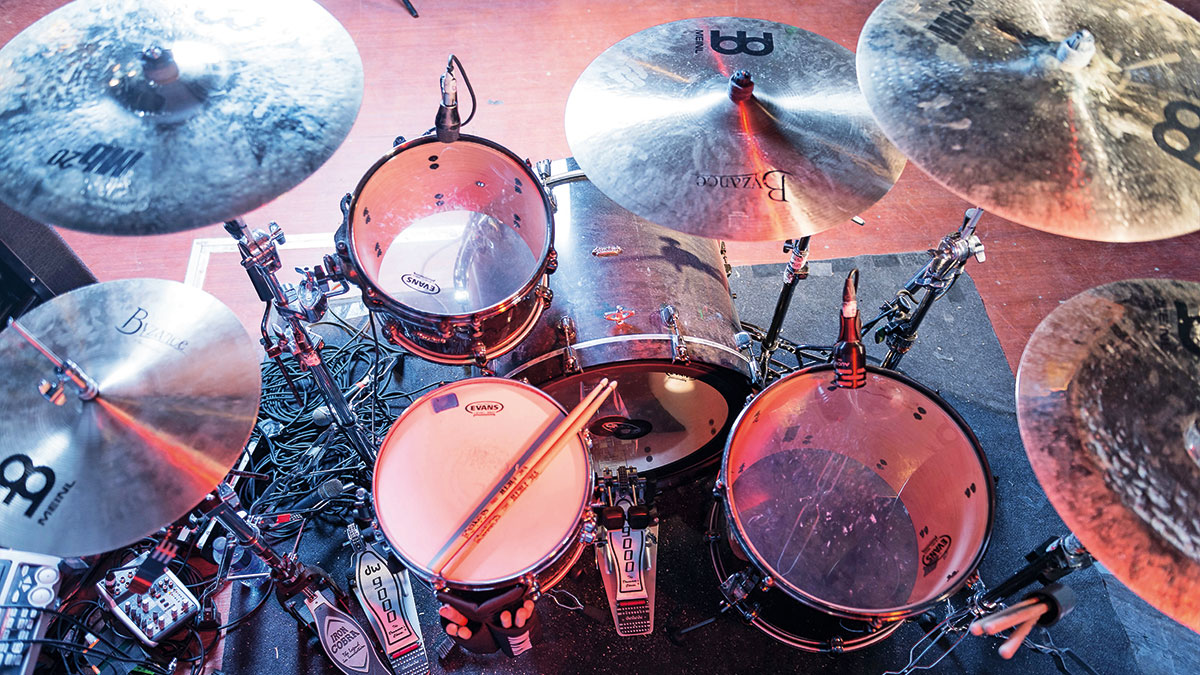Craig Reynolds talks blast beats, YouTube stardom and Stray From The Path
Brit drummer on how to become a session star

Brit drummer on the path to session stardom
From brutal death metal with Viatrophy to pummelling hardcore with Stray From The Path, through prog rock and fusion, Craig Reynolds has forged a career as a drummer- for-hire far from the usual session world of pop and r'n'b.
“It was primarily doing it because I love it and at some point it crossed over into being a job,” says Reynolds who studied at the ACM in Guildford and was inspired to pursue the session path by Josh Freese, who’s done everything from Nine Inch Nails to Sting and Avril Lavigne.
“I thought, I’d love to do that. I don’t get bored but sometimes I want to play punk, sometimes I want to play metal, and luckily sometimes someone will send me an email and say, ‘We’re doing this fusion album, do you want to do it?’”
The first time Reynolds was paid for his playing, the money was an afterthought. “A guy from where I grew up had some friends who were going to China on tour and they needed a drummer,” he says. “I went to China when I was 17 and played this festival which was amazing, it was the first proper gig I played with a PA, never mind in front of 6,000 people. At the end they gave me £250 and I was like, ‘Wow, I just had a holiday and I got £250 for it!’ Now, with over 720,000 views on his YouTube channel, he’s a fast-rising name in British metal drumming.
How did you come to be a metal session player ?
“I was doing a death metal band called Viatrophy and that’s where I got my name. It was at the time when blast beats were pretty cool but not that many people could do them. The reason I could do them was because I had a part-time job in a little off-licence in the village where I grew up. There would be three customers a day and I had a 12-hour shift. I had one of those Moon Gel practice pads, so I would just sit in the back and do single strokes.
“We toured quite a lot, we went to India, we did some cool stuff and then we broke up. That was probably a turning point in wanting to just play for other people because I put my heart into that band for three years and then we split up over something too stupid to mention. I was crushed, like, that’s it, I’m going to keep playing drums but I’m just going to play for other people.
"I put my heart into that band for three years and then we split up over something too stupid to mention. I was crushed."
“Through Viatrophy I ended up playing for The HAARP Machine which was on a US label, Sumerian Records, which Stray From The Path are on. They had a huge online following so when I did The HAARP Machine record it was like, bang, 500,000 subscribers on YouTube see it straight away. That’s when my YouTube channel went up. The more the YouTube went up, the more people went, ‘Can you play on this?’ Or, ‘Can you come on tour?’”
Have you always maintained a strong online presence?
“Viatrophy was big on Myspace. You could put a video or a song up and 20,000 people could see it that day. I saw that as a tool. The day Viatrophy split up, I booked a studio and an engineer and I did my first drum play-through video on YouTube because at that point I wanted to do another band or some session work straight away.
“That was how I got into The HAARP Machine. In the Myspace realm, there were a lot of drummers that weren’t as good as they sounded. There were so many death metal bands that would program the drums. Some people would be like, ‘That’s the best drummer ever!’
“But some people would be like, ‘I’m not sure that’s real.’ YouTube was the way to say, ‘This is what I do.’ I picked a song from the Viatrophy album that was supposed to come out but didn’t. I was really proud of the drums. I video’d it, put it on the internet. Then The HAARP Machine contacted me and said, ‘We need a drummer.’”

'Why are you choosing this screaming music when you could super-easily be in One Direction?'
Do you ever worry about being pigeon-holed as just a metal player?
“I went to see a band in the Brighton Concorde 2 and the drummer looked so bored. He was nailing what he was doing but there was a part in the song where it had to go away from metal for a second and he just wasn’t nailing that bit. I was like, ‘I don’t want to be that guy,’ and that was at a point where I was putting 100 percent of my practice time into metal.
“Any musician that plays heavy music will sympathise with the Christmas dinner conversation where your nan goes, ‘Why don’t you do pop music? That’s easy and there is loads of money in it. Why are you choosing this screaming music when you could super-easily be in One Direction?’ It’s not that easy to do at all. The moral is I like to play different genres of music.
“I get a little bored. I will have a period where I go, I’m all about blast beats, let’s do two hours a day on blast beats. Then six weeks later I’m like, let’s do jazz. It was never like I want to be the best at everything. It’s Jack of all trades, trying to get away with all of them. I feel like the thing that got me employed more with metal was the jazzier things that I did in Viatrophy.
"I will have a period where I go, I’m all about blast beats, let’s do two hours a day on blast beats. Then six weeks later I’m like, let’s do jazz."
"That was a death metal album but I would stick a Dave Weckl 6/8 thing in there. I think it’s that stuff that got me the gigs outside of it because people that listen to Cannibal Corpse don’t listen to the Dave Weckl Band. In fact, on the Viatrophy album, in the ‘Thanks’, I thank my parents, my family and Dave Weckl’s mullet. I ripped off loads of Weckl in that. Get some splashes in there.”
How vital is it for you to have your own studio in this day and age?
“One hundred percent. I live in fear that one day I’m going to flood it and then I’ll have nothing. Because of Superior Drummer and Easy Drummer and all the VST [Virtual Studio Technology] software, people can program an amazing sound. You can get a bit of software under £100 which gives you the drum sound from Abbey Road.
“Of your possible fee that you can charge for playing on an album, you’ve got to cut it in half because this person can just program it, and you’ve got to cut that in half again because they’ve got to book a studio, so the price you can ask is nothing, but it costs upwards of thousands of pounds to record an album properly, especially if you’re hiring a drummer. I did an album where I was recording somewhere else and I worked out I was getting like £3.30 an hour.
“It was great, I didn’t care, but it is sadly a by-product of technology that you can’t really do session work any more unless you’re Ash Soan. You cannot do metal session work unless you’ve got a home studio because no one has got any money. The advance for a metal album is a fraction of the advance for an Adele album. Learning how to use all that stuff is essential.

'My dad's retired, he had nothing to do and I was like, 'Let's build a studio.'
How did you go about learning to use the recording technology?
“The internet. I didn’t have one lesson anywhere. I bought a load of microphones and I Googled, ‘How do I set up microphones?’ Then I read it all. This is when I was working in that job doing nothing. What am I going to do today? Learn how to mic a drum kit! Trial and error.
“How do I record? How do I make a kick drum sound good? The internet is amazing. If I was having trouble, my snare drum sounds boxy, you just type in on Ask Jeeves, ‘Why is my snare drum boxy?’ Or ‘frequency for boxy snare drum’ and then the first thing that comes up is ‘Scoop 500Hz’, and that’s how I did it. I’m not great at it but I’m good enough to get by. I’m a massive YouTube advocate, as long as the comments are nice!”
When did you build your studio?
“It was a project between me and my dad. My dad’s retired, he had nothing to do and I was like, ‘Let’s build a studio. I’ll fund it, but I don’t know how to do anything. You’re clever, you know what to do.’ It was a father-son bonding thing, it was really cool. We got a quote from a soundproofing specialist, 16-grand, and again we went on the internet, ‘How do you soundproof a room?’ Got all these diagrams, a room within a room and stuff like that, what you have to do, what you build it all out of, then we went and got all the materials and it was a fraction of that. It took us about six months because we did everything, just me and my dad.”
You joined Stray From The Path. What drove that decision?
“Twenty percent of being in a band is being good enough to be in that band, and the other 80 percent is being able to get on with people. I’m on a bus with 24 other blokes and I’ve been on that bus for three weeks now and we haven’t had one argument.
"I didn’t have one [recording] lesson anywhere. I bought a load of microphones and I Googled, ‘How do I set up microphones?’ Then I read it all."
“About a week into this tour they said, ‘Do you want to just join? This is where we are, this is the deal, this is what you’ll get,’ and I was like ‘Yeah, let’s do it.’ I’ll still do session stuff. Although I love session work, it’s nice to have a band. It’s a combination of music ADHD, wanting to do everything, and the flipside of that, I want a home, I want a progression.
"And like every musician on the planet, you’ve got an ego thing, I want to create music, so when you’re just touring and doing session work you’re being paid to emulate someone, which is cool and you learn a lot from it. Dan [Bourke], who was in Stray From The Path before me, is an amazing drummer and I’ve learned loads from his stuff, but at the same time I’m looking forward to doing an album with them so I can Weckl all over it. Stick some Weckl in a hardcore song.”